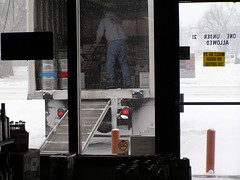Common small business mistakes have become a regular series here. Today, a couple of examples of blaming the customer.
 I called the local paper to have an ad pulled. The gal said OK. But it ran again the next day. I called back. The response was, “You didn’t call soon enough yesterday.” But I knew that she was wrong.
I called the local paper to have an ad pulled. The gal said OK. But it ran again the next day. I called back. The response was, “You didn’t call soon enough yesterday.” But I knew that she was wrong.- I tried to get my liquor sales rep to help me arrange an extra delivery for an item I didn’t receive. He said to me, “It’s your own fault not getting it ordered correctly.” And I knew that he was right.
What do these two examples have in common? Blaming the customer. In one case, it was true, and in one case it wasn’t. It didn’t matter. In both cases, I was more unhappy after being blamed. That’s just human nature. No one likes to be blamed.
Solution
Make a neutral statement or even take the blame on yourself, but don’t ever blame the customer, even if it’s true.
You may suggest actions that will prevent problems in the future, or explain the procedure the customer.
And just a reminder. Who is your customer? Anyone whose actions affect your results.
Customers, vendors, bankers, employees, and government officials are all customers. Treat them with the same level of respect. (Credit Steve Yastrow for the definition of a customer.)
Do you have examples?
Together, we are going to try to help each other out of these most common, deadly mistakes. You can use real world examples, real small businesses. Write it up, take a picture, or shoot a short video. Take care not to embarrass the offenders! Key point: include suggestions on how to do it right!
New to SmallBizSurvival.com? Take the Guided Tour. Like what you see? Get our updates. Want more stories? Read our shared stories from all over.










